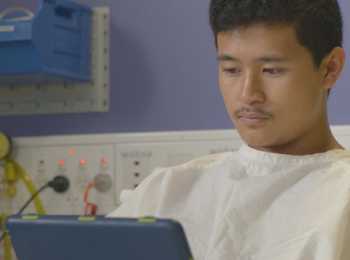How can I help in my family?
Try to be flexible – It’s likely that family routines and schedules may change, doctors’ appointments may be rescheduled, treatment is planned then the plan changes; just knowing this and trying to sit with the change could be helpful.
Help at home – If your parent can’t do as much as they used to whilst they are having treatment, it possibly could help to share the workload with other family members. Relatives and friends may also be able to help. Try and divide up the responsibilities fairly between the rest of the family.
Spend time with them – Your parent might appreciate you doing something without being asked, even a small gesture (like making a cup of tea) can make a big difference.
It’s ok to talk about normal things – These conversations can be a good distraction from thinking about cancer, just because there is cancer doesn’t mean the conversations you usually would have as a family need to stop.
Keep your distance if you’re sick – When someone is being treated for cancer, they can get infections more easily. That’s because treatment can reduce the number of white blood cells that fight infections, making it easier to catch colds or the flu.
An infection could make them sicker, so they may need to stay away from crowded places or people who have an illness they could catch. You can help by:
- washing your hands with soap and water regularly to avoid spreading germs
- letting your parents know if you’ve been in contact with someone who is sick or has a cold
- not coming in close contact with your parent if you get sick
- checking with the doctors or nurses if you are worried about infections that may harm your parent.
I don’t always want to be with my parent. Is this normal?
Even if you love your parent, you might not want to be around them all the time. It might feel uncomfortable, you may be a little guilty, but it’s okay to spend time with your partner, friends or doing other things.
When your parent is having treatment
Having treatment for cancer may mean your parent has to go to hospital. This may be for surgery, chemotherapy (chemo) or radiation therapy (radiotherapy), or other procedures. If your parent has surgery, they may need to stay one or more nights in hospital (this is called being an inpatient).
Hospitals can be busy and noisy places, which can feel overwhelming. Knowing what to expect can help make visiting the hospital less stressful.
Treatment for cancer can be a long process. Chemotherapy and radiation therapy means going to hospital every day for a few weeks or months (outpatient). These visits can last for a few hours. If it feels ok, you could offer to go with them, once you’re there you may be surprised to find it different to be how you thought it would be, this may be a comfort.
Before the visit
It is ok to ask what you might see and hear when you visit, such as:
- What machines, tubes, drips, or other equipment will your parent be connected to?
- Are you allowed to touch them?
- Will the treatment change how they may look?
Given the visits can be long, it could help to bring along some things to entertain you.
When visiting is too hard
You may not be able to visit because you’re juggling other things in your life like study or work. Hospital visiting hours may make it hard to fit it all in. Try not to worry if you can’t visit all the time, or planning-ahead may now be something that you have to think more about.
Sometimes visiting the hospital can feel difficult. If it feels too much to visit, you can stay in touch with your parent in other ways like texting or video calling. If you continue to feel like you can’t visit, it may help to talk to someone trusted or a health professional about what you’re feeling and why you’re not visiting.
If it is difficult to visit, here are some things you could try:
- Make the visits short
- Visit at quieter times
- Let your parent know when you get there how you are planning to stay
Travelling for treatment
The major hospitals for cancer treatment are usually in large cities. If you live outside a city, this may mean your parent must travel for treatment and be away from home for a while. Travelling for treatment may be more complicated if you’re in a one-parent family or if your other parent must go as well.
It could be a lonely experience for you and your family, or it could also be a time when you find out more about who your village is. You may have heard of the idea that "It takes a village to raise a child”, meaning that it takes more than just the family to raise a child, it takes everyone else who is important in the family’s circle to be there.
Using other words, it could be said that “It takes a village to get a family through cancer”.
It could be your village is made up of people in your extended family, friends, school, community groups etc – Your village is your own experience of community.
Possible ways to look after yourself
We all have things we do to look after ourselves and try to deal with difficult situations when they come up for us. This may be things you’re aware that you’re doing, or even unaware. These things we do can also be called other things like “Coping Strategies”, “Relaxation Strategies”, “Self-Care” or “Emotion Regulation Strategies”.
When your parent is diagnosed with cancer it could help to have a clear idea about what makes up your “Toolkit” for looking after yourself and facing tough times.
Some people are aware of what their toolkit is, other people may not be. At the least it could be helpful to be thinking about what these things are, sometimes writing up a list can be helpful, and an idea might be to stick it up on your bedroom wall.
If you’re unsure of ideas, or want some more, here are a few things you could try:
- Talk to someone – Talking can help clear your head and reduce worries, it can be a great way to think through problems out loud with somebody else.
"Cry if you want to. Don’t worry about what people think, they’ll deal". Erin
- Exercise AND rest – Exercise and activity is proven to reduce stress, it releases a chemical in your body called Endorphins that are proven to improve people’s moods, it doesn’t matter what the exercise is – It could be a walk or even a mountain climb! On the other hand, rest and sleep are both also super important to keep things on track with your body and how you’re feeling.
- Get creative – Things like writing, drawing, painting, photography, scrapbooking, collaging are all great ways to let out how you’re feeling, it can make our minds less cluttered when they feel jumbled or too fast, it can slow things down.
- Keep doing things you enjoy – Things like writing, drawing, painting, photography, scrapbooking, collaging are all great ways to let out how you’re feeling, it can make our minds less cluttered when they feel jumbled or too fast, it can slow things down.
- Try something new – What could this be?
- Join an online community – You might want to check out Canteen Connect (canteenconnect.org), it could help to chat with other young people going through something similar to you.
"I watched a lot of movies and TV shows. Focusing on these fictitious stories somehow helped me escape reality and forget about my problems". Melissa
- Try mindfulness – This is all about being in the moment and can help you manage stress. There are several apps that can help you get started with mindfulness, including headspace and Smiling Mind
- Sensory toys or tools – Play with a pet or squeeze a stress ball, there is a lot of science behind sensory play and tools are effective in calming our bodies. It could help to develop your own sensory toolkit, to make your own toolkit you could base ideas on each of the 5 senses: touch, smell, hear, see, and taste – you may also be somebody who prefers one sense over another.
- Plan! – Use a weekly planner and a to-do list to keep track of tasks, especially if you have taken on extra roles in the family. Being more organised could help you feel more grounded and more in control.
"Escaping into novels was good for a while. I used to drive to the beach and just sit there and cry or pray, it was calming and so beautiful there". Sarah
Managing other people’s expectations
You might think (or people might be telling you) that you should be doing or acting in certain ways, like trying to ‘be positive’. It can help to be optimistic, but you don’t have to feel happy and hopeful all the time, try to feel confident that you know what is going to be best for you and your family.
It could help to remember it’s okay to:
- not be perfect all the time
- not feel brave all the time
- not feel positive all the time
- And it’s ok to do things your way


















